Leadership: Qualities, Theories, and Skill Enhancement Essay
VerifiedAdded on 2021/06/15
|11
|2581
|18
Essay
AI Summary
This essay delves into the multifaceted realm of leadership, exploring various theories such as the Great Man Theory, Trait Theory, Behavioral Theory, Contingency Theory, Situational Theory, and Path Goal Theory. It examines different leadership styles, including Laissez-Faire, Autocratic, Participative/Democratic, Transactional, and Transformational leadership, highlighting their characteristics and applications within organizational contexts. The essay further analyzes the essential qualities of effective managers, such as strategic thinking, communication skills, risk-taking abilities, and interpersonal skills. It also emphasizes the importance of building relationships, fostering teamwork, and enhancing leadership skills through active listening, delegation, and understanding people's expectations. The essay provides a comprehensive overview of leadership principles and practical strategies for personal and professional development, aiming to equip readers with the knowledge and insights to become successful leaders.
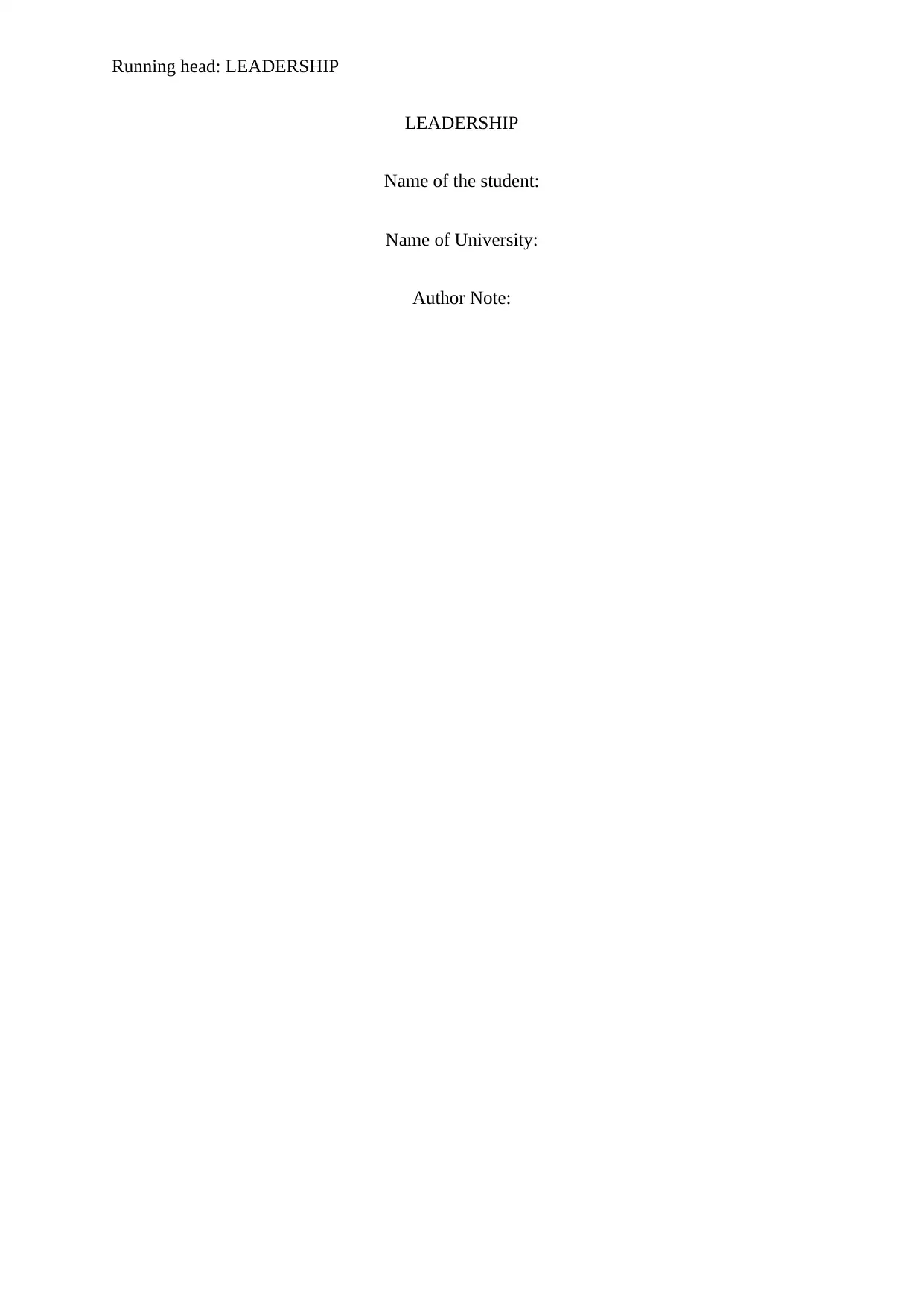
Running head: LEADERSHIP
LEADERSHIP
Name of the student:
Name of University:
Author Note:
LEADERSHIP
Name of the student:
Name of University:
Author Note:
Paraphrase This Document
Need a fresh take? Get an instant paraphrase of this document with our AI Paraphraser
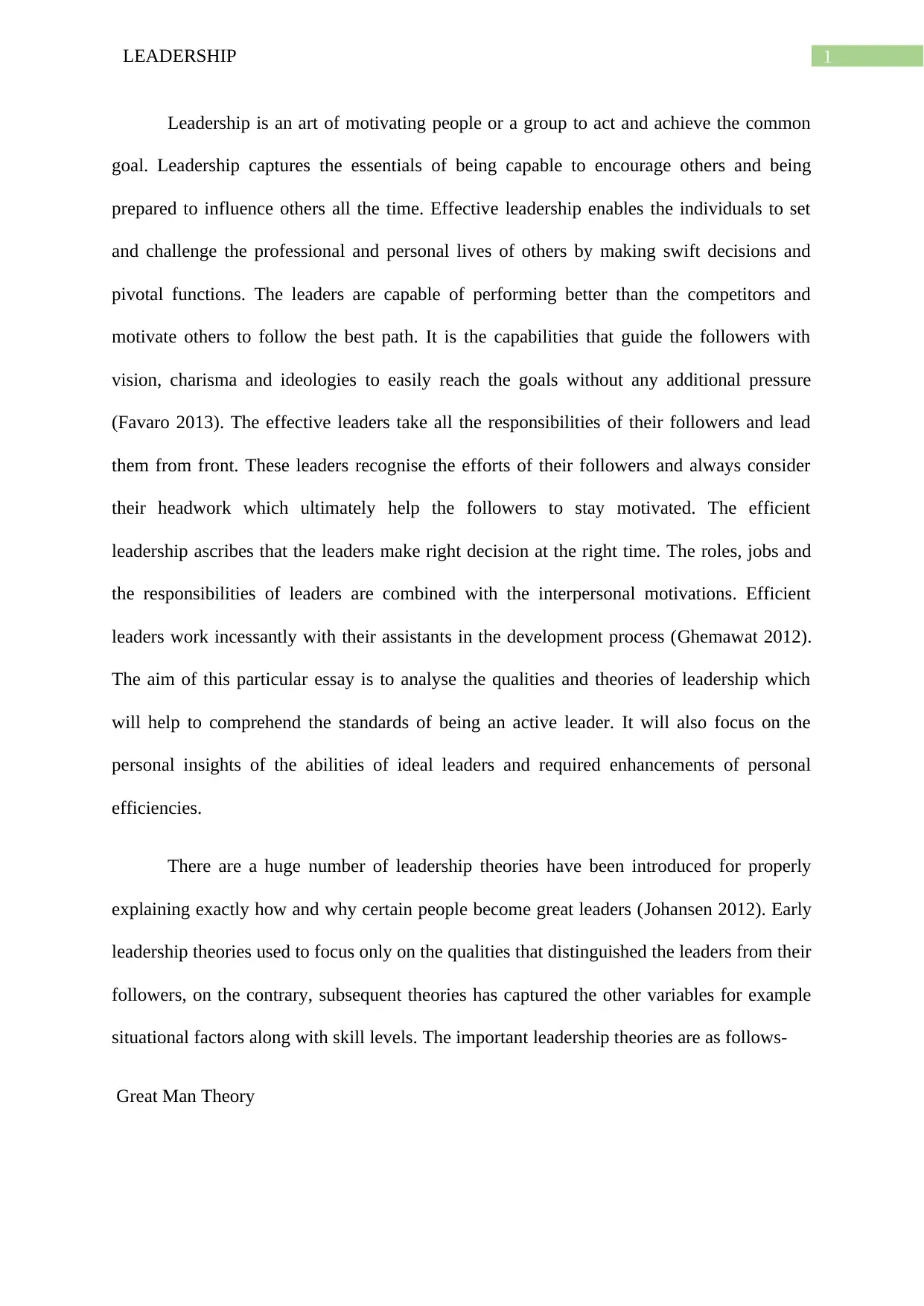
1LEADERSHIP
Leadership is an art of motivating people or a group to act and achieve the common
goal. Leadership captures the essentials of being capable to encourage others and being
prepared to influence others all the time. Effective leadership enables the individuals to set
and challenge the professional and personal lives of others by making swift decisions and
pivotal functions. The leaders are capable of performing better than the competitors and
motivate others to follow the best path. It is the capabilities that guide the followers with
vision, charisma and ideologies to easily reach the goals without any additional pressure
(Favaro 2013). The effective leaders take all the responsibilities of their followers and lead
them from front. These leaders recognise the efforts of their followers and always consider
their headwork which ultimately help the followers to stay motivated. The efficient
leadership ascribes that the leaders make right decision at the right time. The roles, jobs and
the responsibilities of leaders are combined with the interpersonal motivations. Efficient
leaders work incessantly with their assistants in the development process (Ghemawat 2012).
The aim of this particular essay is to analyse the qualities and theories of leadership which
will help to comprehend the standards of being an active leader. It will also focus on the
personal insights of the abilities of ideal leaders and required enhancements of personal
efficiencies.
There are a huge number of leadership theories have been introduced for properly
explaining exactly how and why certain people become great leaders (Johansen 2012). Early
leadership theories used to focus only on the qualities that distinguished the leaders from their
followers, on the contrary, subsequent theories has captured the other variables for example
situational factors along with skill levels. The important leadership theories are as follows-
Great Man Theory
Leadership is an art of motivating people or a group to act and achieve the common
goal. Leadership captures the essentials of being capable to encourage others and being
prepared to influence others all the time. Effective leadership enables the individuals to set
and challenge the professional and personal lives of others by making swift decisions and
pivotal functions. The leaders are capable of performing better than the competitors and
motivate others to follow the best path. It is the capabilities that guide the followers with
vision, charisma and ideologies to easily reach the goals without any additional pressure
(Favaro 2013). The effective leaders take all the responsibilities of their followers and lead
them from front. These leaders recognise the efforts of their followers and always consider
their headwork which ultimately help the followers to stay motivated. The efficient
leadership ascribes that the leaders make right decision at the right time. The roles, jobs and
the responsibilities of leaders are combined with the interpersonal motivations. Efficient
leaders work incessantly with their assistants in the development process (Ghemawat 2012).
The aim of this particular essay is to analyse the qualities and theories of leadership which
will help to comprehend the standards of being an active leader. It will also focus on the
personal insights of the abilities of ideal leaders and required enhancements of personal
efficiencies.
There are a huge number of leadership theories have been introduced for properly
explaining exactly how and why certain people become great leaders (Johansen 2012). Early
leadership theories used to focus only on the qualities that distinguished the leaders from their
followers, on the contrary, subsequent theories has captured the other variables for example
situational factors along with skill levels. The important leadership theories are as follows-
Great Man Theory
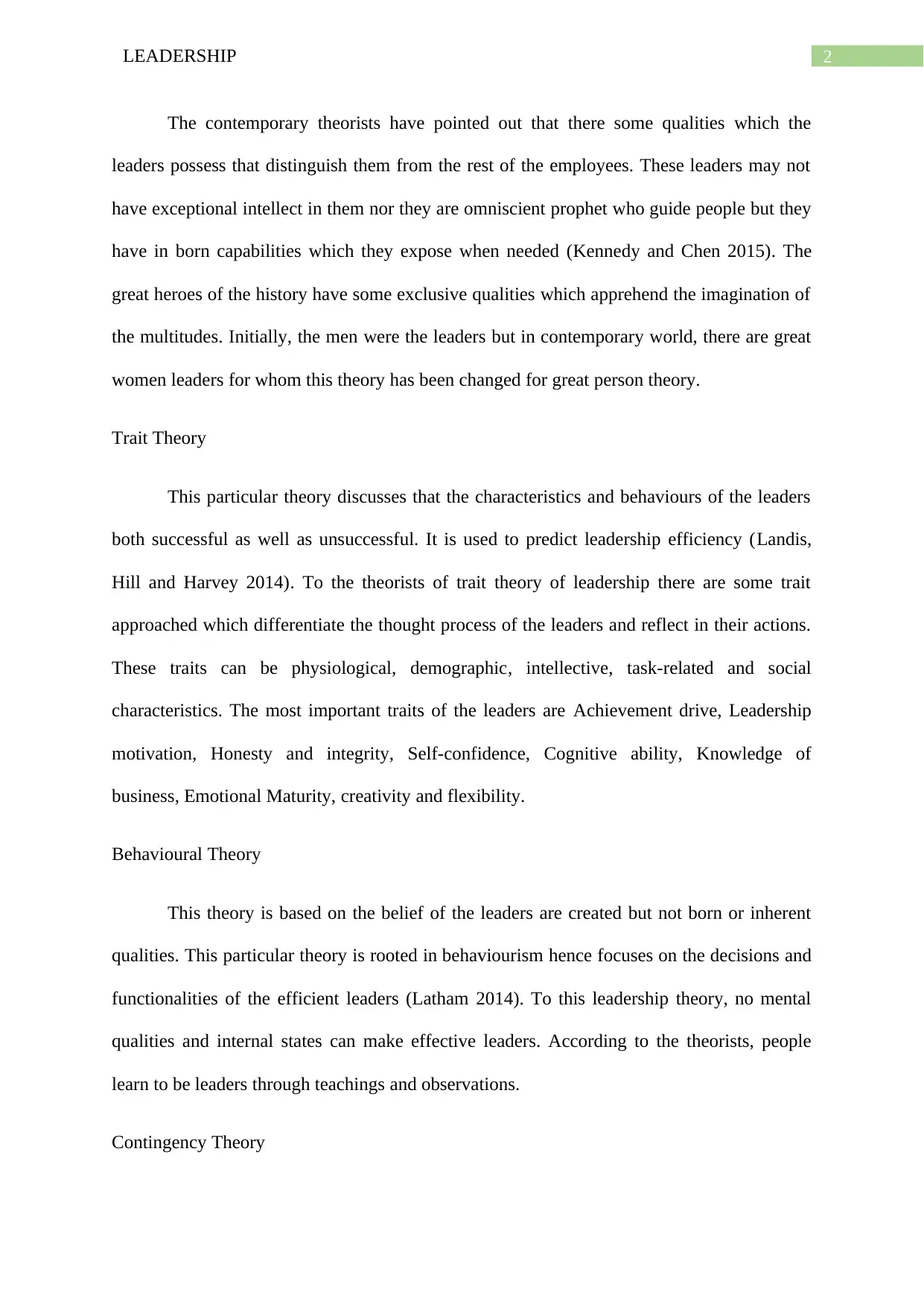
2LEADERSHIP
The contemporary theorists have pointed out that there some qualities which the
leaders possess that distinguish them from the rest of the employees. These leaders may not
have exceptional intellect in them nor they are omniscient prophet who guide people but they
have in born capabilities which they expose when needed (Kennedy and Chen 2015). The
great heroes of the history have some exclusive qualities which apprehend the imagination of
the multitudes. Initially, the men were the leaders but in contemporary world, there are great
women leaders for whom this theory has been changed for great person theory.
Trait Theory
This particular theory discusses that the characteristics and behaviours of the leaders
both successful as well as unsuccessful. It is used to predict leadership efficiency (Landis,
Hill and Harvey 2014). To the theorists of trait theory of leadership there are some trait
approached which differentiate the thought process of the leaders and reflect in their actions.
These traits can be physiological, demographic, intellective, task-related and social
characteristics. The most important traits of the leaders are Achievement drive, Leadership
motivation, Honesty and integrity, Self-confidence, Cognitive ability, Knowledge of
business, Emotional Maturity, creativity and flexibility.
Behavioural Theory
This theory is based on the belief of the leaders are created but not born or inherent
qualities. This particular theory is rooted in behaviourism hence focuses on the decisions and
functionalities of the efficient leaders (Latham 2014). To this leadership theory, no mental
qualities and internal states can make effective leaders. According to the theorists, people
learn to be leaders through teachings and observations.
Contingency Theory
The contemporary theorists have pointed out that there some qualities which the
leaders possess that distinguish them from the rest of the employees. These leaders may not
have exceptional intellect in them nor they are omniscient prophet who guide people but they
have in born capabilities which they expose when needed (Kennedy and Chen 2015). The
great heroes of the history have some exclusive qualities which apprehend the imagination of
the multitudes. Initially, the men were the leaders but in contemporary world, there are great
women leaders for whom this theory has been changed for great person theory.
Trait Theory
This particular theory discusses that the characteristics and behaviours of the leaders
both successful as well as unsuccessful. It is used to predict leadership efficiency (Landis,
Hill and Harvey 2014). To the theorists of trait theory of leadership there are some trait
approached which differentiate the thought process of the leaders and reflect in their actions.
These traits can be physiological, demographic, intellective, task-related and social
characteristics. The most important traits of the leaders are Achievement drive, Leadership
motivation, Honesty and integrity, Self-confidence, Cognitive ability, Knowledge of
business, Emotional Maturity, creativity and flexibility.
Behavioural Theory
This theory is based on the belief of the leaders are created but not born or inherent
qualities. This particular theory is rooted in behaviourism hence focuses on the decisions and
functionalities of the efficient leaders (Latham 2014). To this leadership theory, no mental
qualities and internal states can make effective leaders. According to the theorists, people
learn to be leaders through teachings and observations.
Contingency Theory
⊘ This is a preview!⊘
Do you want full access?
Subscribe today to unlock all pages.

Trusted by 1+ million students worldwide
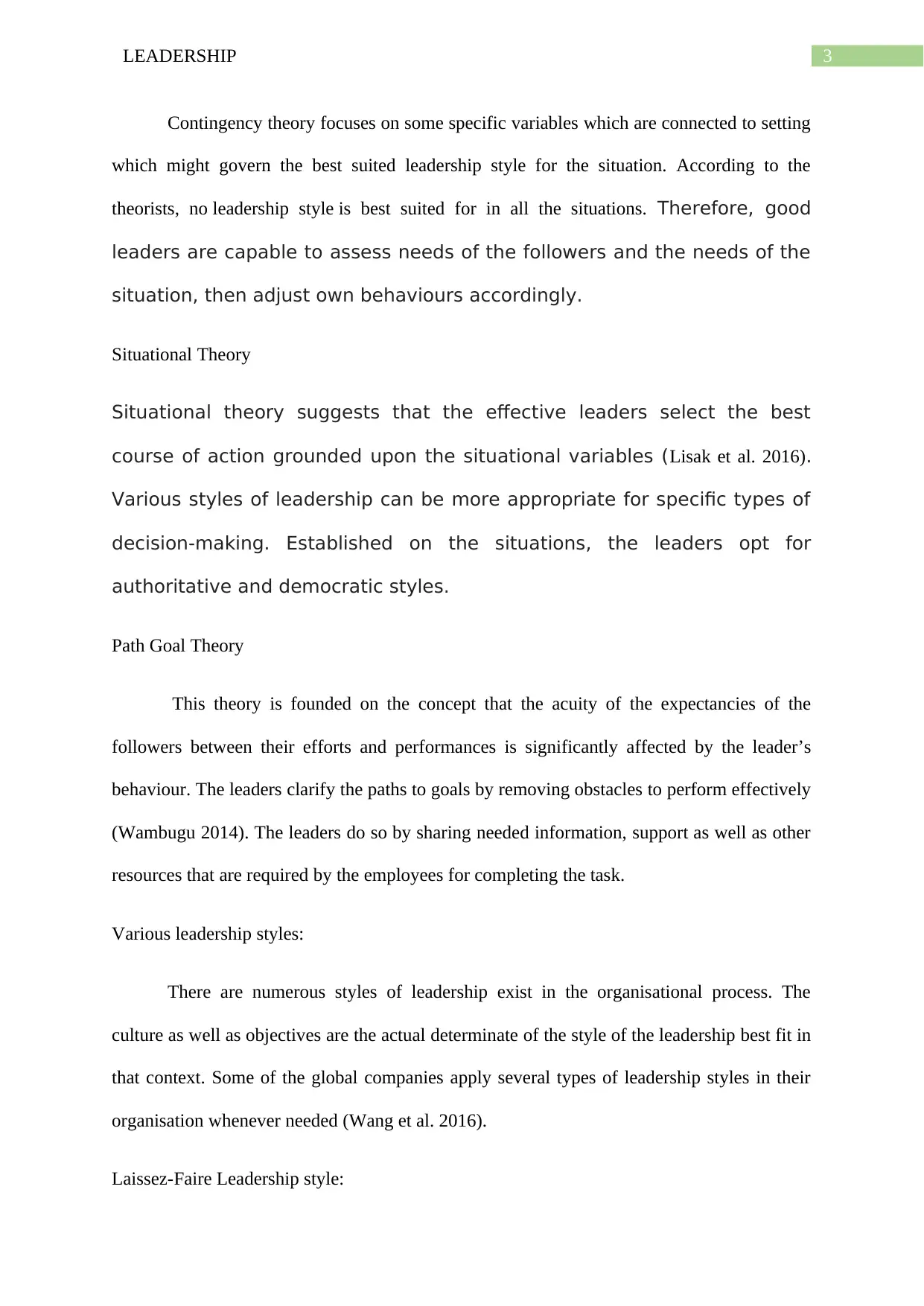
3LEADERSHIP
Contingency theory focuses on some specific variables which are connected to setting
which might govern the best suited leadership style for the situation. According to the
theorists, no leadership style is best suited for in all the situations. Therefore, good
leaders are capable to assess needs of the followers and the needs of the
situation, then adjust own behaviours accordingly.
Situational Theory
Situational theory suggests that the effective leaders select the best
course of action grounded upon the situational variables (Lisak et al. 2016).
Various styles of leadership can be more appropriate for specific types of
decision-making. Established on the situations, the leaders opt for
authoritative and democratic styles.
Path Goal Theory
This theory is founded on the concept that the acuity of the expectancies of the
followers between their efforts and performances is significantly affected by the leader’s
behaviour. The leaders clarify the paths to goals by removing obstacles to perform effectively
(Wambugu 2014). The leaders do so by sharing needed information, support as well as other
resources that are required by the employees for completing the task.
Various leadership styles:
There are numerous styles of leadership exist in the organisational process. The
culture as well as objectives are the actual determinate of the style of the leadership best fit in
that context. Some of the global companies apply several types of leadership styles in their
organisation whenever needed (Wang et al. 2016).
Laissez-Faire Leadership style:
Contingency theory focuses on some specific variables which are connected to setting
which might govern the best suited leadership style for the situation. According to the
theorists, no leadership style is best suited for in all the situations. Therefore, good
leaders are capable to assess needs of the followers and the needs of the
situation, then adjust own behaviours accordingly.
Situational Theory
Situational theory suggests that the effective leaders select the best
course of action grounded upon the situational variables (Lisak et al. 2016).
Various styles of leadership can be more appropriate for specific types of
decision-making. Established on the situations, the leaders opt for
authoritative and democratic styles.
Path Goal Theory
This theory is founded on the concept that the acuity of the expectancies of the
followers between their efforts and performances is significantly affected by the leader’s
behaviour. The leaders clarify the paths to goals by removing obstacles to perform effectively
(Wambugu 2014). The leaders do so by sharing needed information, support as well as other
resources that are required by the employees for completing the task.
Various leadership styles:
There are numerous styles of leadership exist in the organisational process. The
culture as well as objectives are the actual determinate of the style of the leadership best fit in
that context. Some of the global companies apply several types of leadership styles in their
organisation whenever needed (Wang et al. 2016).
Laissez-Faire Leadership style:
Paraphrase This Document
Need a fresh take? Get an instant paraphrase of this document with our AI Paraphraser
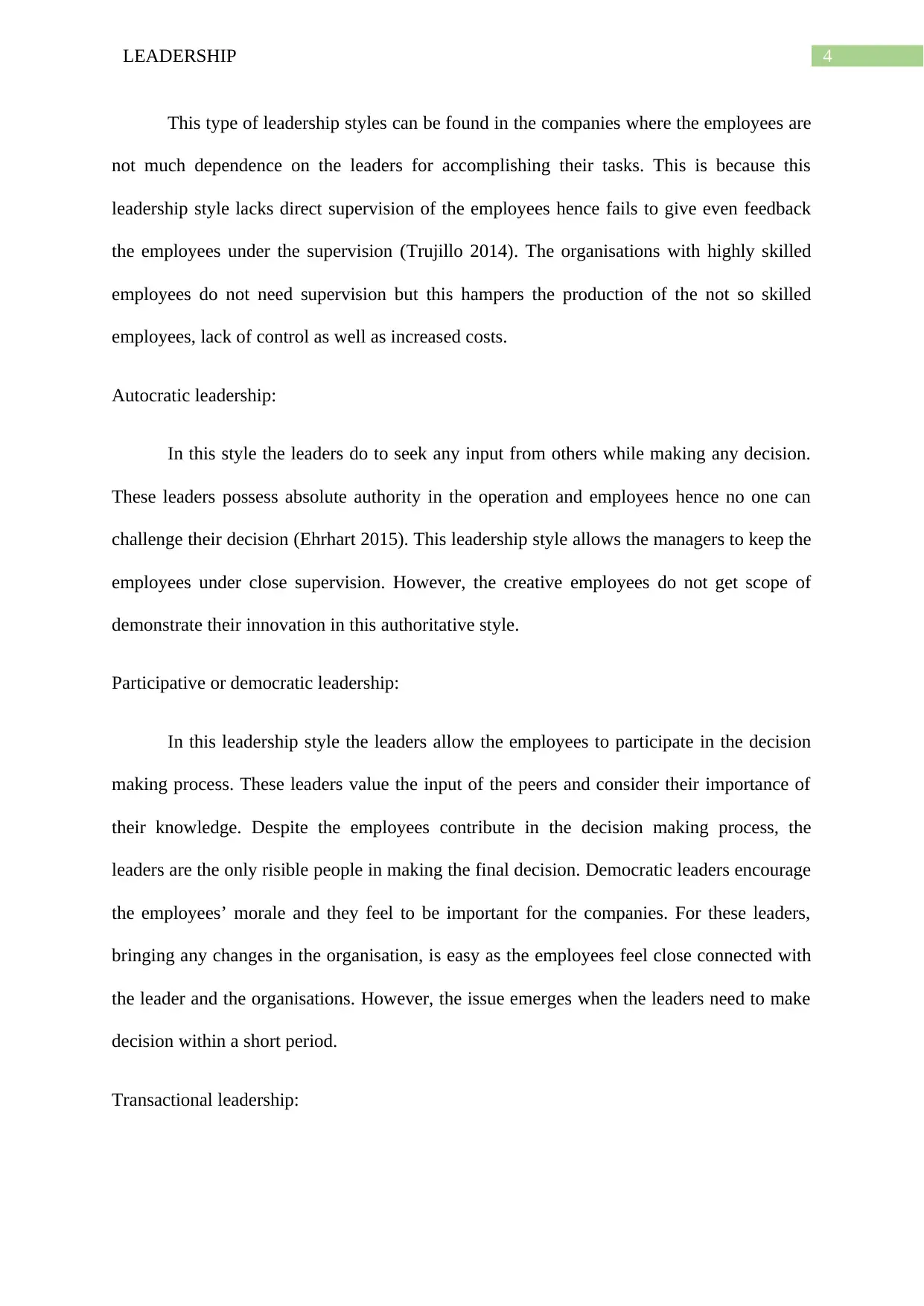
4LEADERSHIP
This type of leadership styles can be found in the companies where the employees are
not much dependence on the leaders for accomplishing their tasks. This is because this
leadership style lacks direct supervision of the employees hence fails to give even feedback
the employees under the supervision (Trujillo 2014). The organisations with highly skilled
employees do not need supervision but this hampers the production of the not so skilled
employees, lack of control as well as increased costs.
Autocratic leadership:
In this style the leaders do to seek any input from others while making any decision.
These leaders possess absolute authority in the operation and employees hence no one can
challenge their decision (Ehrhart 2015). This leadership style allows the managers to keep the
employees under close supervision. However, the creative employees do not get scope of
demonstrate their innovation in this authoritative style.
Participative or democratic leadership:
In this leadership style the leaders allow the employees to participate in the decision
making process. These leaders value the input of the peers and consider their importance of
their knowledge. Despite the employees contribute in the decision making process, the
leaders are the only risible people in making the final decision. Democratic leaders encourage
the employees’ morale and they feel to be important for the companies. For these leaders,
bringing any changes in the organisation, is easy as the employees feel close connected with
the leader and the organisations. However, the issue emerges when the leaders need to make
decision within a short period.
Transactional leadership:
This type of leadership styles can be found in the companies where the employees are
not much dependence on the leaders for accomplishing their tasks. This is because this
leadership style lacks direct supervision of the employees hence fails to give even feedback
the employees under the supervision (Trujillo 2014). The organisations with highly skilled
employees do not need supervision but this hampers the production of the not so skilled
employees, lack of control as well as increased costs.
Autocratic leadership:
In this style the leaders do to seek any input from others while making any decision.
These leaders possess absolute authority in the operation and employees hence no one can
challenge their decision (Ehrhart 2015). This leadership style allows the managers to keep the
employees under close supervision. However, the creative employees do not get scope of
demonstrate their innovation in this authoritative style.
Participative or democratic leadership:
In this leadership style the leaders allow the employees to participate in the decision
making process. These leaders value the input of the peers and consider their importance of
their knowledge. Despite the employees contribute in the decision making process, the
leaders are the only risible people in making the final decision. Democratic leaders encourage
the employees’ morale and they feel to be important for the companies. For these leaders,
bringing any changes in the organisation, is easy as the employees feel close connected with
the leader and the organisations. However, the issue emerges when the leaders need to make
decision within a short period.
Transactional leadership:
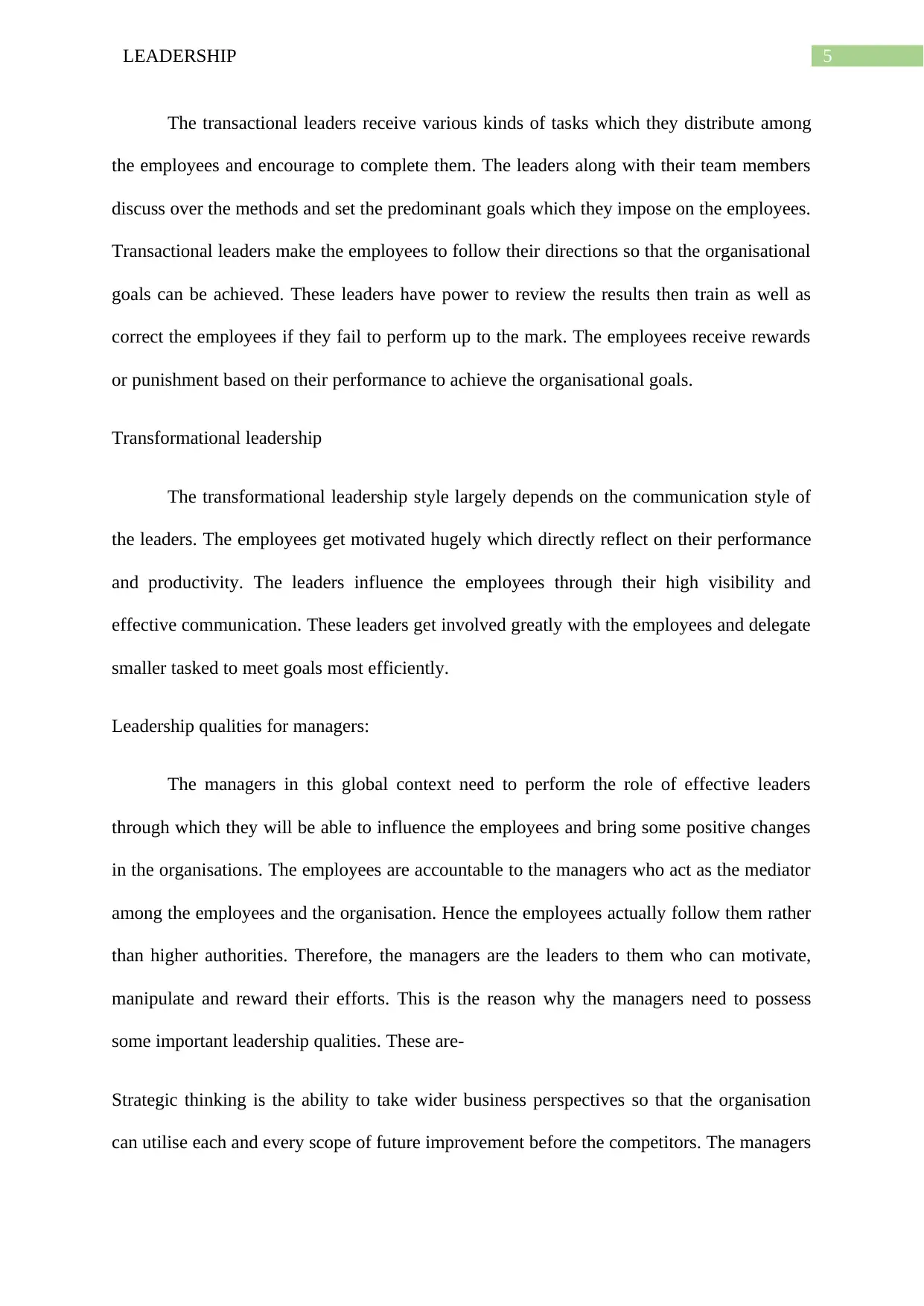
5LEADERSHIP
The transactional leaders receive various kinds of tasks which they distribute among
the employees and encourage to complete them. The leaders along with their team members
discuss over the methods and set the predominant goals which they impose on the employees.
Transactional leaders make the employees to follow their directions so that the organisational
goals can be achieved. These leaders have power to review the results then train as well as
correct the employees if they fail to perform up to the mark. The employees receive rewards
or punishment based on their performance to achieve the organisational goals.
Transformational leadership
The transformational leadership style largely depends on the communication style of
the leaders. The employees get motivated hugely which directly reflect on their performance
and productivity. The leaders influence the employees through their high visibility and
effective communication. These leaders get involved greatly with the employees and delegate
smaller tasked to meet goals most efficiently.
Leadership qualities for managers:
The managers in this global context need to perform the role of effective leaders
through which they will be able to influence the employees and bring some positive changes
in the organisations. The employees are accountable to the managers who act as the mediator
among the employees and the organisation. Hence the employees actually follow them rather
than higher authorities. Therefore, the managers are the leaders to them who can motivate,
manipulate and reward their efforts. This is the reason why the managers need to possess
some important leadership qualities. These are-
Strategic thinking is the ability to take wider business perspectives so that the organisation
can utilise each and every scope of future improvement before the competitors. The managers
The transactional leaders receive various kinds of tasks which they distribute among
the employees and encourage to complete them. The leaders along with their team members
discuss over the methods and set the predominant goals which they impose on the employees.
Transactional leaders make the employees to follow their directions so that the organisational
goals can be achieved. These leaders have power to review the results then train as well as
correct the employees if they fail to perform up to the mark. The employees receive rewards
or punishment based on their performance to achieve the organisational goals.
Transformational leadership
The transformational leadership style largely depends on the communication style of
the leaders. The employees get motivated hugely which directly reflect on their performance
and productivity. The leaders influence the employees through their high visibility and
effective communication. These leaders get involved greatly with the employees and delegate
smaller tasked to meet goals most efficiently.
Leadership qualities for managers:
The managers in this global context need to perform the role of effective leaders
through which they will be able to influence the employees and bring some positive changes
in the organisations. The employees are accountable to the managers who act as the mediator
among the employees and the organisation. Hence the employees actually follow them rather
than higher authorities. Therefore, the managers are the leaders to them who can motivate,
manipulate and reward their efforts. This is the reason why the managers need to possess
some important leadership qualities. These are-
Strategic thinking is the ability to take wider business perspectives so that the organisation
can utilise each and every scope of future improvement before the competitors. The managers
⊘ This is a preview!⊘
Do you want full access?
Subscribe today to unlock all pages.

Trusted by 1+ million students worldwide
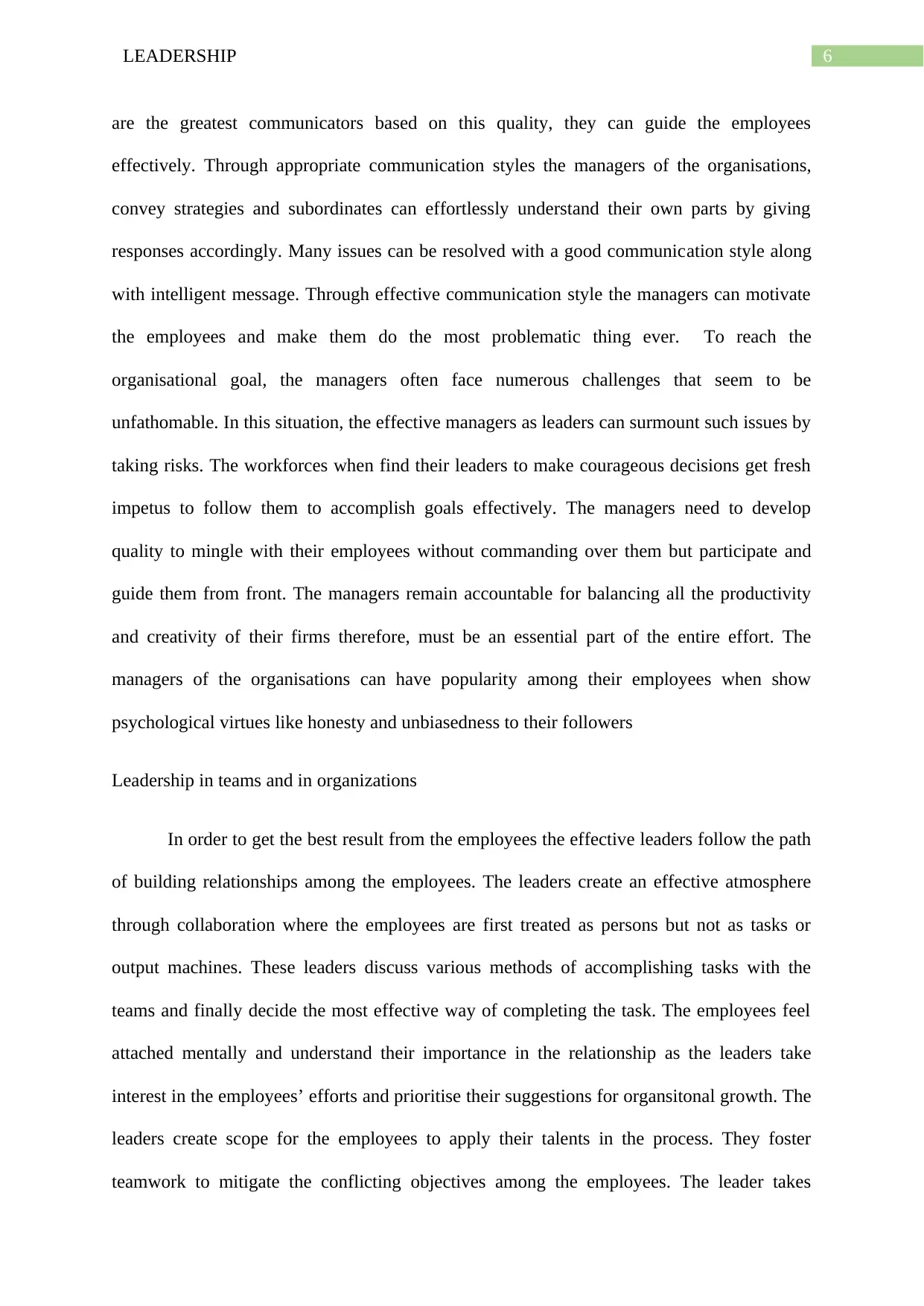
6LEADERSHIP
are the greatest communicators based on this quality, they can guide the employees
effectively. Through appropriate communication styles the managers of the organisations,
convey strategies and subordinates can effortlessly understand their own parts by giving
responses accordingly. Many issues can be resolved with a good communication style along
with intelligent message. Through effective communication style the managers can motivate
the employees and make them do the most problematic thing ever. To reach the
organisational goal, the managers often face numerous challenges that seem to be
unfathomable. In this situation, the effective managers as leaders can surmount such issues by
taking risks. The workforces when find their leaders to make courageous decisions get fresh
impetus to follow them to accomplish goals effectively. The managers need to develop
quality to mingle with their employees without commanding over them but participate and
guide them from front. The managers remain accountable for balancing all the productivity
and creativity of their firms therefore, must be an essential part of the entire effort. The
managers of the organisations can have popularity among their employees when show
psychological virtues like honesty and unbiasedness to their followers
Leadership in teams and in organizations
In order to get the best result from the employees the effective leaders follow the path
of building relationships among the employees. The leaders create an effective atmosphere
through collaboration where the employees are first treated as persons but not as tasks or
output machines. These leaders discuss various methods of accomplishing tasks with the
teams and finally decide the most effective way of completing the task. The employees feel
attached mentally and understand their importance in the relationship as the leaders take
interest in the employees’ efforts and prioritise their suggestions for organsitonal growth. The
leaders create scope for the employees to apply their talents in the process. They foster
teamwork to mitigate the conflicting objectives among the employees. The leader takes
are the greatest communicators based on this quality, they can guide the employees
effectively. Through appropriate communication styles the managers of the organisations,
convey strategies and subordinates can effortlessly understand their own parts by giving
responses accordingly. Many issues can be resolved with a good communication style along
with intelligent message. Through effective communication style the managers can motivate
the employees and make them do the most problematic thing ever. To reach the
organisational goal, the managers often face numerous challenges that seem to be
unfathomable. In this situation, the effective managers as leaders can surmount such issues by
taking risks. The workforces when find their leaders to make courageous decisions get fresh
impetus to follow them to accomplish goals effectively. The managers need to develop
quality to mingle with their employees without commanding over them but participate and
guide them from front. The managers remain accountable for balancing all the productivity
and creativity of their firms therefore, must be an essential part of the entire effort. The
managers of the organisations can have popularity among their employees when show
psychological virtues like honesty and unbiasedness to their followers
Leadership in teams and in organizations
In order to get the best result from the employees the effective leaders follow the path
of building relationships among the employees. The leaders create an effective atmosphere
through collaboration where the employees are first treated as persons but not as tasks or
output machines. These leaders discuss various methods of accomplishing tasks with the
teams and finally decide the most effective way of completing the task. The employees feel
attached mentally and understand their importance in the relationship as the leaders take
interest in the employees’ efforts and prioritise their suggestions for organsitonal growth. The
leaders create scope for the employees to apply their talents in the process. They foster
teamwork to mitigate the conflicting objectives among the employees. The leader takes
Paraphrase This Document
Need a fresh take? Get an instant paraphrase of this document with our AI Paraphraser
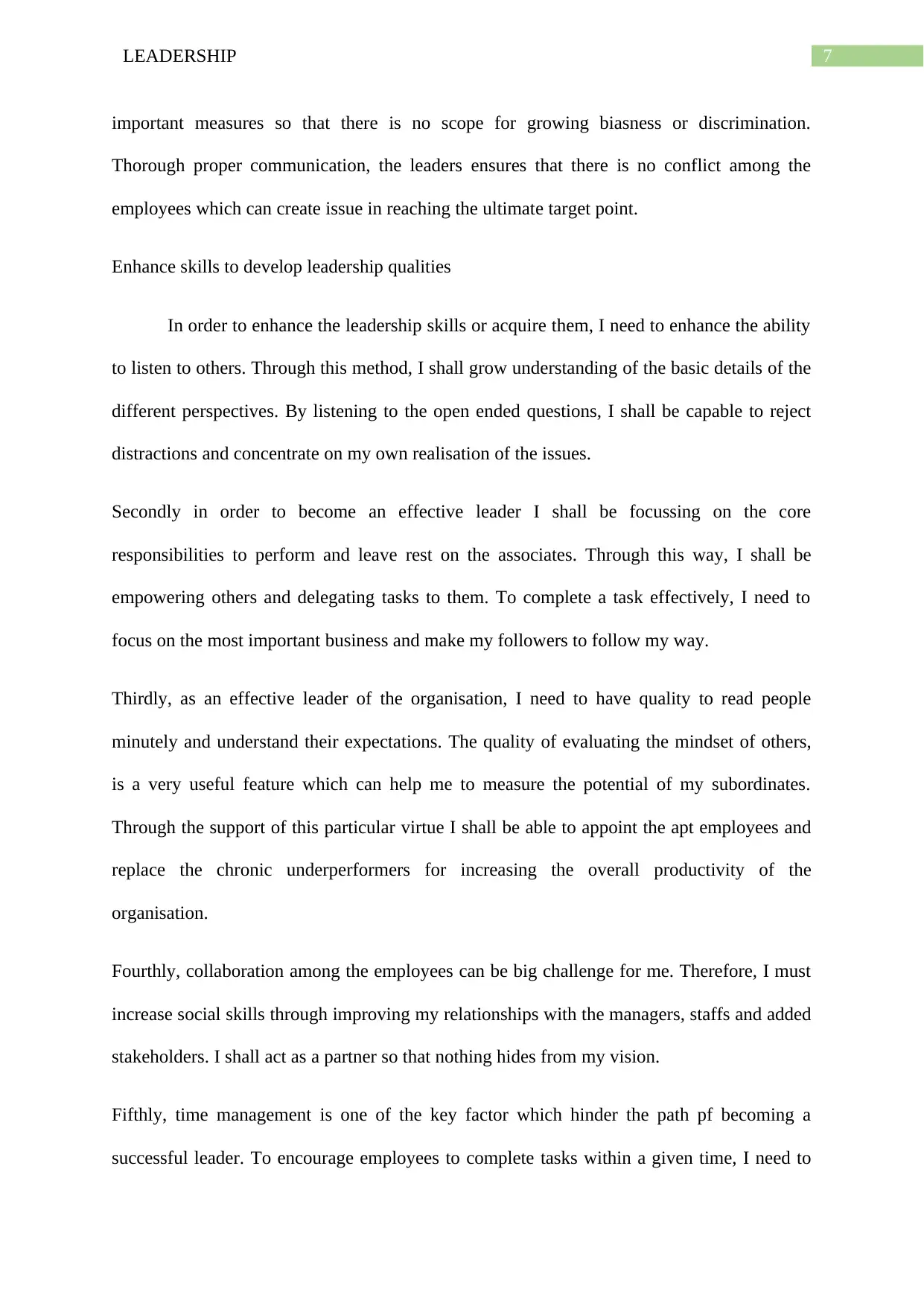
7LEADERSHIP
important measures so that there is no scope for growing biasness or discrimination.
Thorough proper communication, the leaders ensures that there is no conflict among the
employees which can create issue in reaching the ultimate target point.
Enhance skills to develop leadership qualities
In order to enhance the leadership skills or acquire them, I need to enhance the ability
to listen to others. Through this method, I shall grow understanding of the basic details of the
different perspectives. By listening to the open ended questions, I shall be capable to reject
distractions and concentrate on my own realisation of the issues.
Secondly in order to become an effective leader I shall be focussing on the core
responsibilities to perform and leave rest on the associates. Through this way, I shall be
empowering others and delegating tasks to them. To complete a task effectively, I need to
focus on the most important business and make my followers to follow my way.
Thirdly, as an effective leader of the organisation, I need to have quality to read people
minutely and understand their expectations. The quality of evaluating the mindset of others,
is a very useful feature which can help me to measure the potential of my subordinates.
Through the support of this particular virtue I shall be able to appoint the apt employees and
replace the chronic underperformers for increasing the overall productivity of the
organisation.
Fourthly, collaboration among the employees can be big challenge for me. Therefore, I must
increase social skills through improving my relationships with the managers, staffs and added
stakeholders. I shall act as a partner so that nothing hides from my vision.
Fifthly, time management is one of the key factor which hinder the path pf becoming a
successful leader. To encourage employees to complete tasks within a given time, I need to
important measures so that there is no scope for growing biasness or discrimination.
Thorough proper communication, the leaders ensures that there is no conflict among the
employees which can create issue in reaching the ultimate target point.
Enhance skills to develop leadership qualities
In order to enhance the leadership skills or acquire them, I need to enhance the ability
to listen to others. Through this method, I shall grow understanding of the basic details of the
different perspectives. By listening to the open ended questions, I shall be capable to reject
distractions and concentrate on my own realisation of the issues.
Secondly in order to become an effective leader I shall be focussing on the core
responsibilities to perform and leave rest on the associates. Through this way, I shall be
empowering others and delegating tasks to them. To complete a task effectively, I need to
focus on the most important business and make my followers to follow my way.
Thirdly, as an effective leader of the organisation, I need to have quality to read people
minutely and understand their expectations. The quality of evaluating the mindset of others,
is a very useful feature which can help me to measure the potential of my subordinates.
Through the support of this particular virtue I shall be able to appoint the apt employees and
replace the chronic underperformers for increasing the overall productivity of the
organisation.
Fourthly, collaboration among the employees can be big challenge for me. Therefore, I must
increase social skills through improving my relationships with the managers, staffs and added
stakeholders. I shall act as a partner so that nothing hides from my vision.
Fifthly, time management is one of the key factor which hinder the path pf becoming a
successful leader. To encourage employees to complete tasks within a given time, I need to

8LEADERSHIP
break the tasks and assign the perfectly suited people to complete them. Through proper job
designing, I will be able to enrich the workers in one hand and indulge more value added
activities in the organisation.
Finally, as an effective leader I need to reduce my prejudices and biases and promote
diversity in the organisation. Thus I shall become an effective leader and help to excel my
organisation.
break the tasks and assign the perfectly suited people to complete them. Through proper job
designing, I will be able to enrich the workers in one hand and indulge more value added
activities in the organisation.
Finally, as an effective leader I need to reduce my prejudices and biases and promote
diversity in the organisation. Thus I shall become an effective leader and help to excel my
organisation.
⊘ This is a preview!⊘
Do you want full access?
Subscribe today to unlock all pages.

Trusted by 1+ million students worldwide
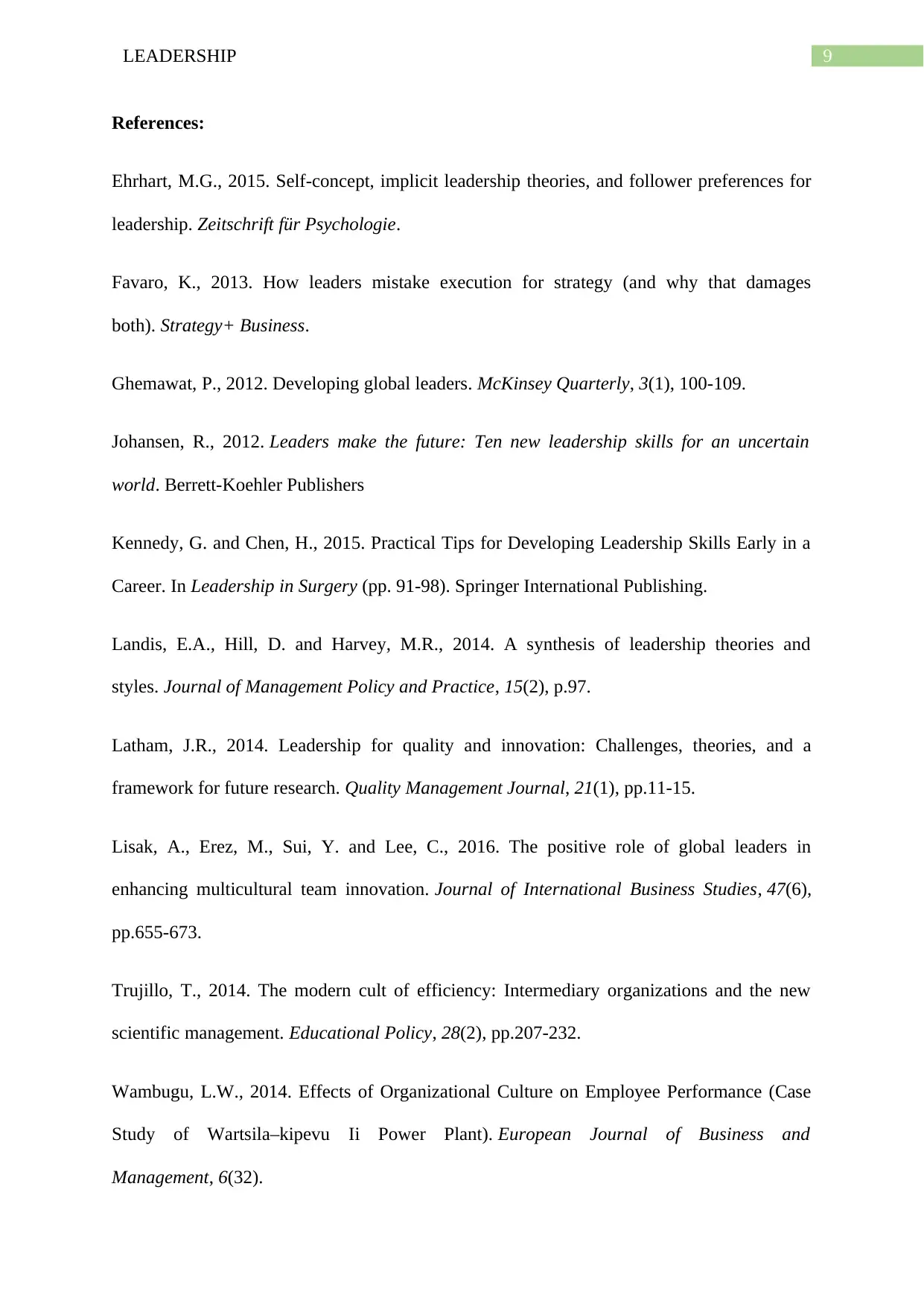
9LEADERSHIP
References:
Ehrhart, M.G., 2015. Self-concept, implicit leadership theories, and follower preferences for
leadership. Zeitschrift für Psychologie.
Favaro, K., 2013. How leaders mistake execution for strategy (and why that damages
both). Strategy+ Business.
Ghemawat, P., 2012. Developing global leaders. McKinsey Quarterly, 3(1), 100-109.
Johansen, R., 2012. Leaders make the future: Ten new leadership skills for an uncertain
world. Berrett-Koehler Publishers
Kennedy, G. and Chen, H., 2015. Practical Tips for Developing Leadership Skills Early in a
Career. In Leadership in Surgery (pp. 91-98). Springer International Publishing.
Landis, E.A., Hill, D. and Harvey, M.R., 2014. A synthesis of leadership theories and
styles. Journal of Management Policy and Practice, 15(2), p.97.
Latham, J.R., 2014. Leadership for quality and innovation: Challenges, theories, and a
framework for future research. Quality Management Journal, 21(1), pp.11-15.
Lisak, A., Erez, M., Sui, Y. and Lee, C., 2016. The positive role of global leaders in
enhancing multicultural team innovation. Journal of International Business Studies, 47(6),
pp.655-673.
Trujillo, T., 2014. The modern cult of efficiency: Intermediary organizations and the new
scientific management. Educational Policy, 28(2), pp.207-232.
Wambugu, L.W., 2014. Effects of Organizational Culture on Employee Performance (Case
Study of Wartsila–kipevu Ii Power Plant). European Journal of Business and
Management, 6(32).
References:
Ehrhart, M.G., 2015. Self-concept, implicit leadership theories, and follower preferences for
leadership. Zeitschrift für Psychologie.
Favaro, K., 2013. How leaders mistake execution for strategy (and why that damages
both). Strategy+ Business.
Ghemawat, P., 2012. Developing global leaders. McKinsey Quarterly, 3(1), 100-109.
Johansen, R., 2012. Leaders make the future: Ten new leadership skills for an uncertain
world. Berrett-Koehler Publishers
Kennedy, G. and Chen, H., 2015. Practical Tips for Developing Leadership Skills Early in a
Career. In Leadership in Surgery (pp. 91-98). Springer International Publishing.
Landis, E.A., Hill, D. and Harvey, M.R., 2014. A synthesis of leadership theories and
styles. Journal of Management Policy and Practice, 15(2), p.97.
Latham, J.R., 2014. Leadership for quality and innovation: Challenges, theories, and a
framework for future research. Quality Management Journal, 21(1), pp.11-15.
Lisak, A., Erez, M., Sui, Y. and Lee, C., 2016. The positive role of global leaders in
enhancing multicultural team innovation. Journal of International Business Studies, 47(6),
pp.655-673.
Trujillo, T., 2014. The modern cult of efficiency: Intermediary organizations and the new
scientific management. Educational Policy, 28(2), pp.207-232.
Wambugu, L.W., 2014. Effects of Organizational Culture on Employee Performance (Case
Study of Wartsila–kipevu Ii Power Plant). European Journal of Business and
Management, 6(32).
Paraphrase This Document
Need a fresh take? Get an instant paraphrase of this document with our AI Paraphraser
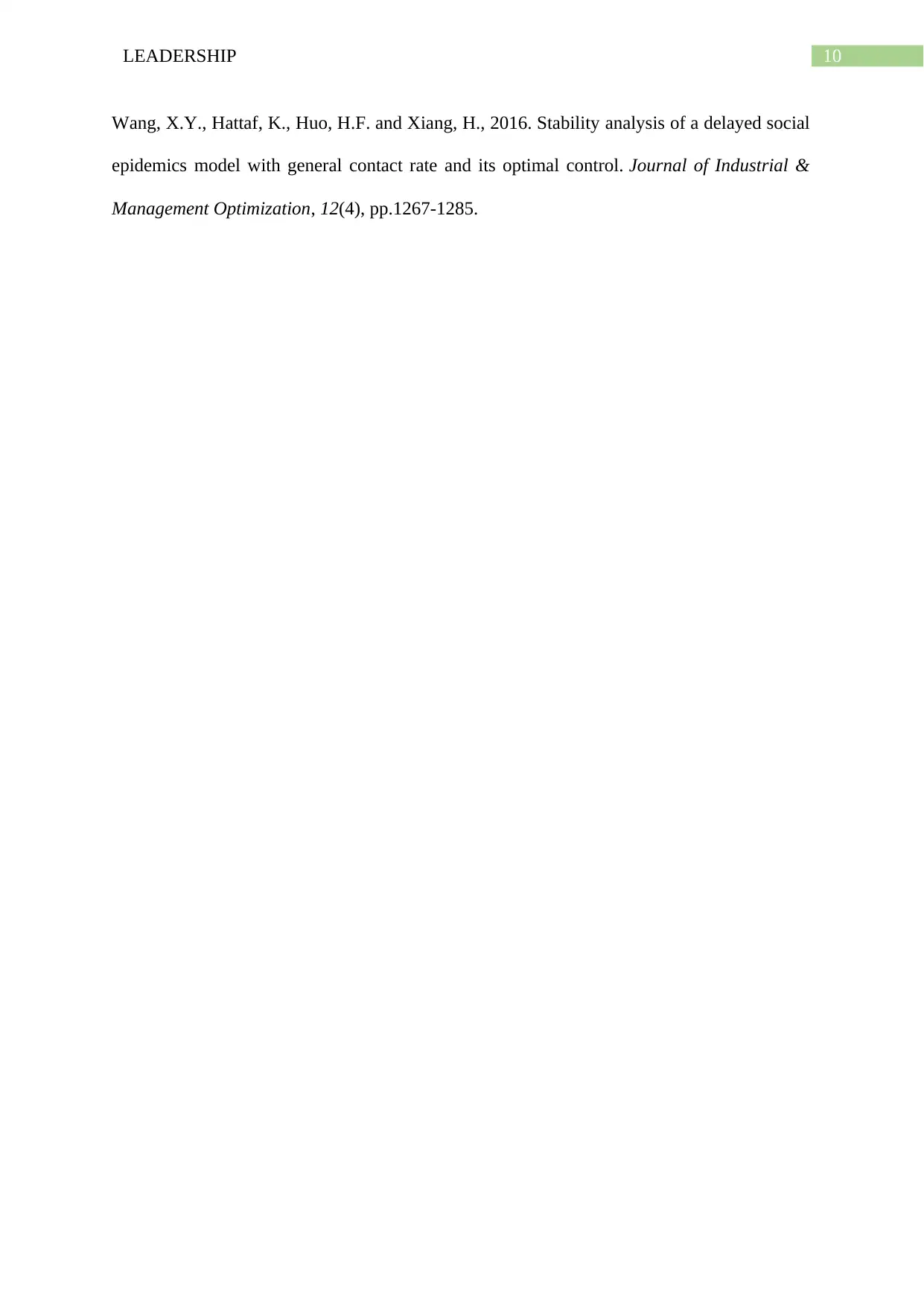
10LEADERSHIP
Wang, X.Y., Hattaf, K., Huo, H.F. and Xiang, H., 2016. Stability analysis of a delayed social
epidemics model with general contact rate and its optimal control. Journal of Industrial &
Management Optimization, 12(4), pp.1267-1285.
Wang, X.Y., Hattaf, K., Huo, H.F. and Xiang, H., 2016. Stability analysis of a delayed social
epidemics model with general contact rate and its optimal control. Journal of Industrial &
Management Optimization, 12(4), pp.1267-1285.
1 out of 11
Related Documents
Your All-in-One AI-Powered Toolkit for Academic Success.
+13062052269
info@desklib.com
Available 24*7 on WhatsApp / Email
![[object Object]](/_next/static/media/star-bottom.7253800d.svg)
Unlock your academic potential
Copyright © 2020–2026 A2Z Services. All Rights Reserved. Developed and managed by ZUCOL.





